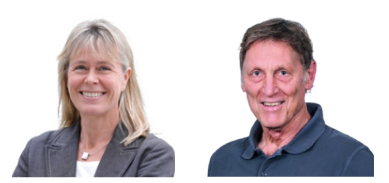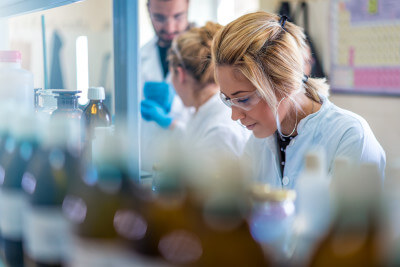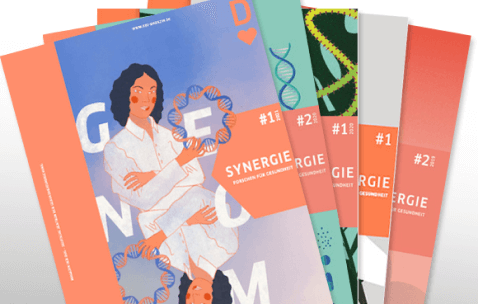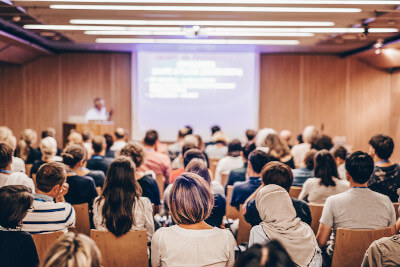2nd Long COVID Symposium of the German Centres for Health Research (DZG)

2nd DZG Munich Day
2nd Long COVID Symposium of the German Centers for Health Research (DZG)
9 May 2025, 9:00 to 17:30, Frankfurt am Main, Senckenberg Museum
Many thanks to everyone who took part in the 2nd Long COVID Symposium – whether on site in Frankfurt or online in the livestream. At times, up to 250 people followed the event.
The video recording of the talks and the presentation slides are available on the DZHK YouTube channel:
To the playlist with individual sessions
The time codes take you directly to the respective talks. These can be found in the video description of the full version.
Looking back via LinkedIn: Post 9/5/2025
Looking back via the picture gallery.
The event brought together leading experts to discuss the latest findings on Long COVID. Around 130 experts from all eight centres met in May. Contributions from patients (Long COVID Deutschland) and physicians (Ärzte- und Ärztinnenverband Long COVID) complemented the scientific perspective. This interdisciplinary symposium focused on advancing research and improving care for those affected by the condition while fostering collaboration across scientific disciplines.
Guests: Members of the Ärzte- und Ärztinnenverband Long COVID (Link)
Welcome to the Long COVID Symposium of DZG
Long COVID is a complex challenge that affects multiple organ systems and requires an interdisciplinary research approach. The German Centers for Health Research (DZG) bring together expertise in a broad spectrum of diseases - including cardiovascular and pulmonary diseases, as well as neurological, metabolic, infectious, oncological, pediatric, and mental health conditions.
For those affected by Long COVID, research is not just about understanding the disease but about finding solutions to improve their lives. This includes people suffering from myalgic encephalomyelitis/chronic fatigue syndrome (ME/CFS), a debilitating post-infectious disease that is in urgent need of more research and better clinical care.
Many patients are still waiting for effective treatments and improved care. That is why this symposium brings together leading researchers and clinicians from all DZG centers to present their latest findings, discuss challenges and explore innovative solutions. By fostering collaboration across disciplines, we aim to accelerate progress and translate research into real benefits for patients.
We invite you to explore the program, share ideas with your peers, and engage in discussions that will drive the future of Long COVID research.
Prof. Stefanie Dimmeler & Prof. Werner Seeger

Scientific Organization:
Prof. Stefanie Dimmeler (DZHK Deutsches Zentrum für Herz-Kreislauf-Forschung)
Prof. Werner Seeger (DZL Deutsches Zentrum für Lungenforschung)
Organizing Team:
Christine Vollgraf & Sarah Mempel, contact: christine.vollgraf@dzhk.de
Friday, 9 May 2025, 09:00–17:30
Livestream: https://www.youtube.com/live/egXh7hWjXOg
Please note: Photos and videos will be taken at this event and may be published. If you do not wish to be recorded, please inform the event team.
8:30-9:00 — Registration & welcome coffee
Opening
09:00–09:05 — Opening
Stefanie Dimmeler (Frankfurt am Main), Werner Seeger (Gießen)
09:05–09:15 — Welcoming address
Veronika von Messling (Berlin, BMFTR - formerly BMBF)
Session 1: Cardiovascular Disease / DZHK
Chair: Philipp Wild (Mainz), Stefanie Dimmeler (Frankfurt am Main)
09:15–09:30 — Myoflame-19 – RCT to improve cardiac symptoms and exercise tolerance by targeting endothelial dysfunction
Valentina Puntmann (Frankfurt am Main)
09:30–09:45 — Thrombo-inflammation in COVID-19
Konstantin Stark (München)
09:45–10:00 — Heart failure and myocarditis in the context of long COVID and post-vaccination: Risks, mechanisms, and clinical insights
Carsten Tschöpe (Berlin)
Session 2: Metabolic Disease / DZD, DKTK
Chair: Silke Andrich (Düsseldorf), Alexandra Nieters (Freiburg)
10:00–10:15 — Persistent symptoms in post-COVID-19 two years after infection: EPILOC study results
Alexandra Nieters (Freiburg)
10:15–10:30 — Diabetes and postinfectious syndromes
Stefan Bornstein (Dresden)
10:30–10:45 — SARS-CoV-2 NSP1 inhibits insulin granule biogenesis and secretion granules but not MHC-class I expression and traffic in beta-cells
Klaus Knoch (Dresden)
10:45–11:15 - Coffee break
Session 3: Neurological and Immunological Aspects of Long COVID / DZNE
Chair: Anna Aschenbrenner, Marc Beyer (both Bonn)
11:15–11:30 — Clinical insights into neurological post-COVID syndrome: Findings from the NEUROCOV project
Omid Shirvani (Bonn)
11:30–11:45 — Towards precision medicine: Single-cell omics and biomarker development in NEUROCOV
Marc Beyer (Bonn)
11:45–12:00 — Immune dysregulation in long COVID and ME/CFS: Insights from single-cell RNA-sequencing studies
Anna Aschenbrenner (Bonn)
Session 4: Mental Health and Sleep Disorders / DZPG
Chair: Martin Walter (Jena)
12:00–12:15 — Ability to work after COVID-19: A machine learning model based on clinical parameters
Tarek Jebrini (München)
12:15–12:30 — SLEEP-NEURO-PATH: Contribution of sleep-related biomarkers to the pathophysiology of ME/CFS
Claudia Schilling (Mannheim)
12:30–12:45 — FEDORA: Post-COVID soon no longer a blind spot?
Martin Walter (Jena)
12:45–13:45 — Lunch break
Young Investigator Session
13:45–14:15 — Rapid fire talks
- Julian Wagner (Frankfurt) — Cardiac Fibrosis and Denervation in Long COVID: The Role of Pre-Existing Cardiovascular Disease
- Gani Oruqaj (Gießen) — Ventilatory inefficency and low cardiac preload in Post-Covid-19 associated dyspnea
- Georg Fritz Kurze (Dresden) — Parasympathetic inflexibility as a potential central factor precipitating and perpetuating post-COVID-19 exhaustion symptoms: a one-year longitudinal study
- Giovanni Vardiero (Tübingen) — Evaluating tVNS for enhancing motivation and recovery in Long COVID: a randomized cross-over study
- Rieke Baumkötter (Mainz) — Risk tools for predicting long-term sequelae based on symptom profiles after known and undetected SARS-CoV-2 infections in the population
- Sepehr Golriz Khatami (Mainz) — Proteomic atlas of post-COVID sequelae
Session 5: Pulmonary Complications of Long COVID / DZL
Chairs: Susanne Herold (Gießen), Rembert Koczulla
4:15–14:25 — Deep clinical phenotyping
Natascha Sommer (Gießen)
14:25–14:35 — Mass spectrometry-based profiling of autoantibodies post-viral infections
Herbert Schiller (München)
14:35–14:45 — Long COVID 19: new insights using functional lung MRI
Jens Vogel-Claussen (Hannover)
14:45–14:55 — COVIDOM+: A population-based study on long-term consequences of COVID-19
Jan Heyckendorf (Kiel)
Coffee break — 15:00–15:20
Session 6: Immunology and Infection Research in Long COVID / DZIF
Chair: Hans-Georg Kräusslich (Heidelberg)
15:20–15:35 — Challenges in the conduct of clinical trials on post COVID syndrome
Maria Vehreschild (Frankfurt am Main)
15:35–15:50 — Immunological aspects of long COVID depending on initial infection severity before vaccination
Christine Falk (Hannover)
15:50–16:05 — Long-term innate and adaptive immune alterations in systemic and tissue-resident compartments following COVID-19
Clara Lehmann (Köln)
Session 7: Pediatric and Adolescent Health in Long COVID / DZKJ
Chair: Klaus-Michael Debatin (Ulm)
16:05–16:20 — Multisystem inflammatory syndrome is linked to viral reactivation
Tilmann Kallinich (Berlin)
16:20–16:35 — Health and well-being of children and adolescents during and after the COVID-19 pandemic
Ulrike Ravens-Sieberer (Hamburg)
16:35–16:50 — Long COVID in pediatrics: What's new?
Nicole Töpfner (Dresden)
Panel Discussion
16:55–17:30 — Die Zukunft der Long-COVID-Forschung – Was brauchen Patientinnen und Patienten?
Panelists:
-
Johanna Theobald (Long COVID Deutschland)
-
Martin Walter (Ärzte- und Ärztinnenverband Long COVID)
-
Wissenschaftlerinnen und Wissenschaftler der DZG
Moderation:
Stefanie Dimmeler, Werner Seeger
Senckenberg Museum, Festsaal im Jügelhaus
Location and directions
The 2nd Long COVID Symposium will take place at the Senckenberg Museum (Festsaal im Jügelhaus), located in the heart of Frankfurt am Main. The museum is renowned for its world-class natural history exhibitions and provides an inspiring setting for scientific exchange.
Address:
Senckenberg Museum, Festsaal im Jügelhaus
Senckenberganlage 25
60325 Frankfurt am Main, Germany
https://museumfrankfurt.senckenberg.de
How to get there:
- By public transport: The Senckenberg Museum is easily accessible via Frankfurt's public transport network. Take the U-Bahn (line U4) to the station "Bockenheimer Warte." From there, it’s a 5-minute walk to the museum.
- By car: If you are arriving by car, parking is available at nearby parking garages, such as "Palmengarten" or "Bockenheimer Warte."
- From Frankfurt Airport: The museum is approximately 20 minutes away by taxi or accessible via the S-Bahn (lines S8 or S9) to Frankfurt Hauptbahnhof, followed by the U4 to "Bockenheimer Warte."
Accommodation:
Participants are requested to arrange their accommodation independently. Frankfurt offers a wide range of hotels and guesthouses suitable for all budgets. Due to high demand, early booking is recommended.
Participation is open to all interested researchers, with priority given to members of the German Centers for Health Research.
Attendance is free of charge.
The confirmation email you receive upon registration also serves as your final confirmation of participation.








